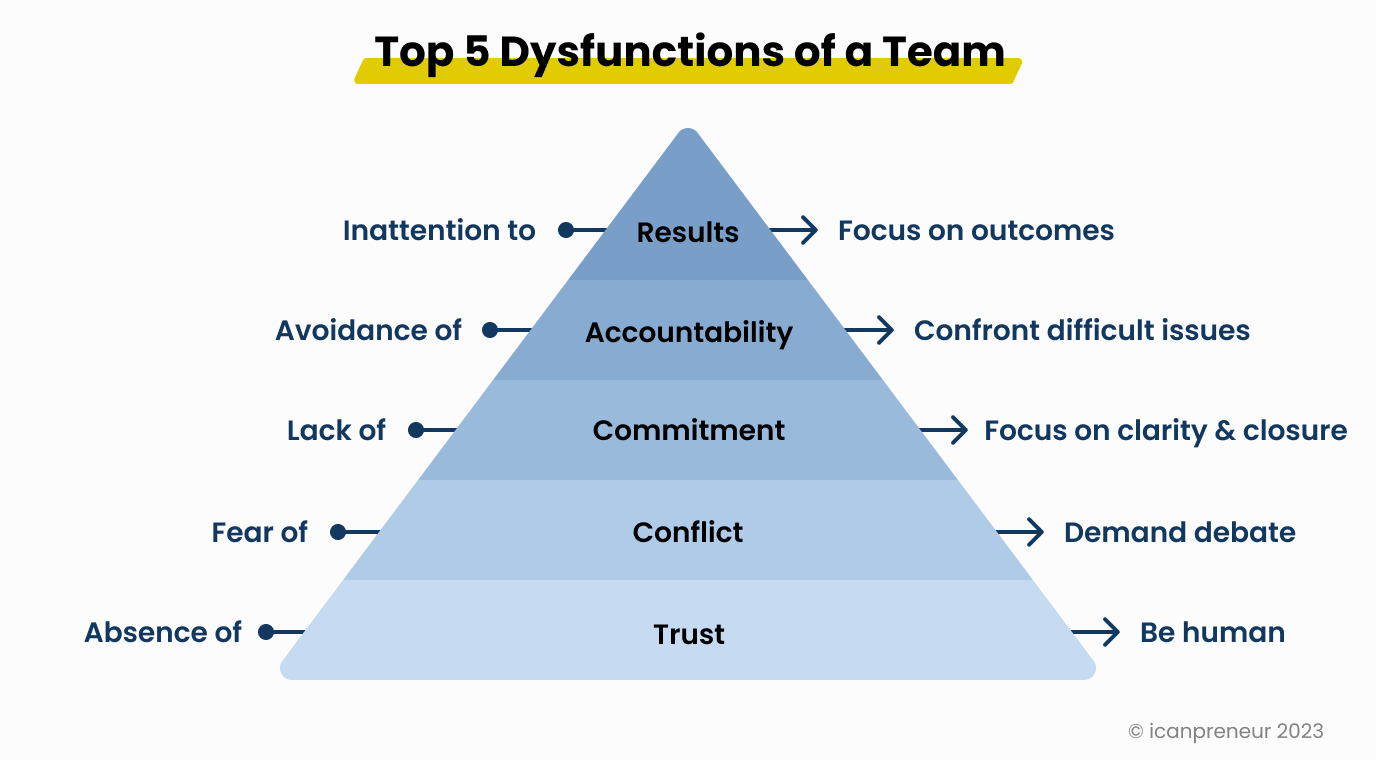Great Startup Teams Are Built, Not Gathered
Jan 6, 2023
Behind every great startup there is a great team of talented individuals. However, a great startup team requires more than just bringing the right people with the right expertise together. It also requires deliberate effort of team building at a basic human level. In this article we will discuss what are the required elements for a successful team. Let’s go!
Why Building Startup Teams Is Hard(er)
As Steve Blank pointed out in his first book The Four Steps to the Epiphany, “startups are not simply a smaller version of large companies". Why is that and how is it related to building teams?
Large companies execute business models while startups search for them. In a large company you are mostly in “the known” - you know who your customers are, what problems you solve for them and through what products and/or services. In contrast, in a startup you are largely in “the unknown”. You are focused on discovering a repeatable and scalable business model, which essentially means you are yet to discover who your customers are, what value you are going to deliver to them and through what solutions.
That difference results in a very important second-order effect. In large companies with customers and reputation to maintain, the primary focus is to deliver predictable, reliable and continuously improving value to customers. Over the course of their life these companies continuously build processes to reduce and eliminate the risk of mistakes. Startups are on the other end of the spectrum. Founding teams have to take risks, accelerate the rate of learning through inevitable (at this stage) failure, and discover the pillars of their future business model step by step.
“The known” brings clarity, certainty and confidence that we know what to do. On the other hand “the unknown” in startups means fuzziness, lack of clarity, lack of certainty and often result in a lot of friction. Building a team in the latter circumstances is typically multiple orders of magnitude harder. Furthermore, a weak team can hardly survive the bumpy road of a startup. A larger company environment is likely to feel like a motorway for that same team.
“OK Vesko! You have my attention. Given that building a team while building a startup is hard, what can be done?”, you might be thinking. Glad you asked!
The Five Elements of a Successful Team
As we mentioned, a successful team requires deliberate effort of team building at a basic human level. Such effort needs to focus on five elements, called “the five dysfunctions of a team” outlined by Patrick Lencioni in his book of the same name. Let’s briefly explore each of them and how they can impact startups.

I. Absence of Trust
Trust is the foundation of any successful team. Without trust, team members are hesitant to be vulnerable with one another, which can lead to a lack of open and honest communication. You have a problem, especially in startups, if you are not ready to be vulnerable to raise your hand when you don’t know something, when you need help or if you don’t feel OK to make mistakes and to share them openly with your teammates. The good news is that detecting the dysfunction and being aware of it is the first step to fix it and build a great team. Building trust is a process that requires sharing experiences, committing and following through, demonstrating credibility, as well as every team member focusing on learning the unique characteristics of everyone else.
II. Fear of Conflict
Conflict is a natural part of any team, and it's important for team members to feel comfortable expressing their opinions and debating ideas. Inferior or incorrect decisions are often a result of an environment where team members do not openly express their views and opinions. If there is a lack of trust between team members, they are often unable to participate in unfiltered and passionate debates and discussions. This results in avoidance of conflict which is replaced with artificial harmony and leaves the original issue at hand unaddressed. The ambiguity in startups makes things even more difficult because in “the unknown” most of the time we are equipped only with our opinions and no facts and realizing that is of critical importance for productive and healthy conflicts.
III. Lack of Commitment
Avoidance of conflicts naturally results in vagueness, ambiguity and uncertainty. Individuals have buy-in and support when their opinion is included in the decision-making process typically through debates. Reaching consensus is not only unnecessary but is also unrealistic. However it is critical to make sure that everyone is heard. The best teams make transparent and informed decisions when they are confident they have the commitment and the support of every team member.
IV. Absence of Accountability
Accountability is key to any successful team. Without accountability, team members may not take ownership of their work, leading to a lack of progress and a breakdown in trust. Accountability is dependent on the commitment of every individual team member. When there is buy-in, the team is far more likely to hold one another accountable. Every individual should feel responsible to hold their team accountable and be OK for others to hold them accountable as well. Success requires a team to have a way to measure progress and have clarity on what needs to be done, by who and in what timeframe.
V. Inattention to Results
In startups, it's crucial for teams to focus on results and continuously strive for improvement. Unless individuals are holding each other accountable, far too often their focus moves away from protecting the team’s interest and toward their own. Lack of accountability means close to zero chances for the team to achieve what they aspire to. A truly result-oriented team is one in which every team member places the team’s results above their own short term personal gains. Successful teams have transparency of results and behaviors that contribute to the overall success of the team should be rewarded.
In Summary
Gathering a group of great individuals does not equal a great team. Great teams are built. Building a great team is hard and building a great startup team is even harder. Don’t underestimate that. It takes time and will be a process that will require the attention, awareness and deliberate effort of every team member.
One More Thing
At Icanpreneur we believe that the #1 reason startups fail 9 out of 10 times is simply because the typical entrepreneurial path is chaotic and is based primarily on gut feeling and luck. We believe that entrepreneurs should use their intuition and gut feeling to imagine the vision of the intended impact of their startup instead of discovering what the entrepreneurship steps are. This is where we can help - at Icanpreneur we are focused on building the guided journey that helps aspiring and early entrepreneurs systematically go from idea, through investment, to product/market fit. Become part of the change now.

